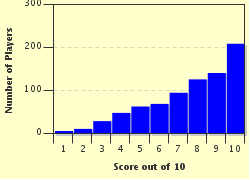Quiz Answer Key and Fun Facts
1. In the famous Sonnet #116, which begins, "Let me not to the marriage of true minds / Admit impediments", the poet defines "Love" as ". . . the star to every wand'ring bark, / Whose worth's unknown, although his heighth be taken." Who is this iconic Renaissance poet and playwright?
2. In a famous novel of the Victorian era, the main character, when he is a boy, is occasionally led by the girl Estella and her lit candle through dark corridors to Miss Havisham's room, where all time has stopped. "Estella" is a derivative of the Latin word for "star," and the main character even compares her to one. What is the name of this novel?
3. Stephen Crane once wrote a short story based on his experience with a shipwreck, an event in which he survived in the Atlantic in a small tub-like vessel with three other men. In this story, he described nature's message to man as "A high cold star on a winter's night". What is the name of this famous American naturalist story?
4. "If the stars should appear one night in a thousand years, how would men believe and adore; and preserve for many generations the remembrance of the city of God which had been shown! But every night come out these preachers of beauty, and light the universe with their admonishing smile". What American transcendentalist and former Unitarian minister wrote these words in an 1836 essay entitled "Nature"?
5. What English Romantic poet, ostracized by the society of his own country for his relationship with a half-sister, wrote the following opening lines to a poem: "She walks in beauty, like the night / Of cloudless climes and starry skies"?
6. A woman named Cosette finds beneath a stone a notebook containing these words: "I encountered in the street, a very poor young man who was in love. His hat was old, his coat was worn, his elbows were in holes; water trickled through his shoes, and the stars through his soul". What lengthy French novel of the 1800's is this--a book initially rejected by critics for being immoral and ridiculously sentimental?
7. "I believe a leaf of grass is no less than the journey-work of the stars". What American poet who also volunteered as an army nurse in the American Civil War would have written such a line about "a leaf of grass"?
8. In a poem called "Ephemera", one can read the following: "How far away the stars seem, and how far / Is our first kiss, and ah, how old my heart!" What twentieth-century Irish poet and playwright, who won a Nobel Prize for Literature and served two terms as a senator for his country, penned these words?
9. "We are all in the gutter, but some of us are looking at the stars", says Lord Darlington from Act III of "Lady Windermere's Fan". What Dubliner, famous for his epigrams and wit, wrote these words published in a play in 1892?
10. "We had the sky up there, all speckled with stars, and we used to lay on our backs and look up at them, and discuss about whether they was made or only just happened". The character speaking here narrates the entire story of how he "lights out for the Territory" to escape "sivilization". What nineteenth-century American novel is this?
Source: Author
alaspooryoric
This quiz was reviewed by FunTrivia editor
looney_tunes before going online.
Any errors found in FunTrivia content are routinely corrected through our feedback system.

